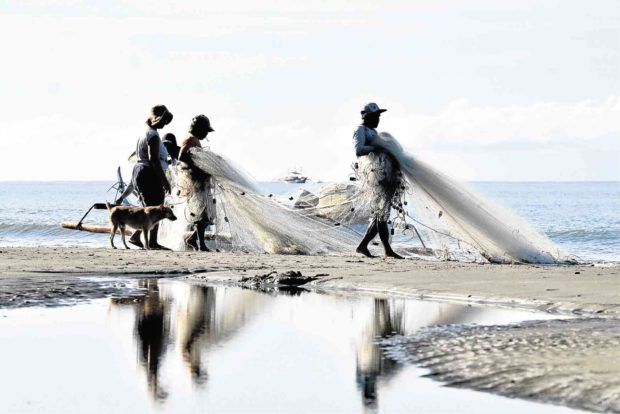
The entry of imported fish into the local market is seen to hurt not only the fishermen but also the aquaculture sector, says Tugon Kabuhayan. —FILE PHOTO
Despite strong opposition from concerned groups, the Department of Agriculture (DA) on Friday said it had approved the importation of 60,000 metric tons (MT) of fish this year to augment the expected shortfall in local production and prevent unwarranted increases in fish prices in the market.
According to a DA statement, Agriculture Secretary William Dar has approved the issuance of a Certificate of Necessity to Import (CNI) for 60,000 MT of roundscad (galunggong), mackerel and bonito as recommended by the Bureau of Fisheries and Aquatic Resources (BFAR).
The entire volume will be sold in public markets, particularly in Metro Manila and fish-deficient areas in the country, it said.
Fish variants that would be imported must be sold at a wholesale price of P88 a kilogram based on the agency’s guidelines.
According to the agency, the imported fish will arrive in the last quarter of the year, in conjunction with the three-month closed fishing seasons imposed in three major fishing areas in the country beginning November.
“Fishing in the Northeast Palawan will be closed from November to January; the Visayan Sea, Nov. 15 to Feb.15, and the Zamboanga Peninsula, Dec. 1 to March 1 of every year,” the DA-BFAR said in an earlier statement.
This is to allow fish species to reproduce and for the fry and juveniles to mature and restore valuable fish stocks, it added.
Advocacy group Tugon Kabuhayan earlier said, however, that fish output during the last quarter traditionally peaks in contrast to the DA’s claim, adding that aquaculture players had always been ready to fill the gap brought by the closed fishing seasons.
“We are doing a balancing act, wherein our primordial concern is to enhance and sustain the development of our fisheries sector and provide our fellow citizens affordable fish on their table,” said Dar.
“Further, such policy decisions eases the pressure on food inflation, thus benefiting mostly our poor countrymen whose purchasing power has been reduced due to the economic slowdown and the COVID-19 pandemic,” he added.
The certificates to import that would be issued by the DA are valid from Sept. 2 to Dec. 31 this year. The volume approved is slightly lower than BFAR’s initial recommendation at 65,000 MT.
The National Economic and Development Authority, for its part, had proposed to import a maximum volume of 200,000 MT of fish between the last quarter of the year and the first quarter of 2022.
The import volume will be apportioned through an auction system, the DA said. Transferring allocations would not be allowed.
Tugon Kabuhayan said “dumping imported fish into the market … [will] likely hurt not only the fishing sector but the country’s aquaculture industry as well,” adding that the DA should conduct broad-based consultations across all stakeholders before deciding to import.